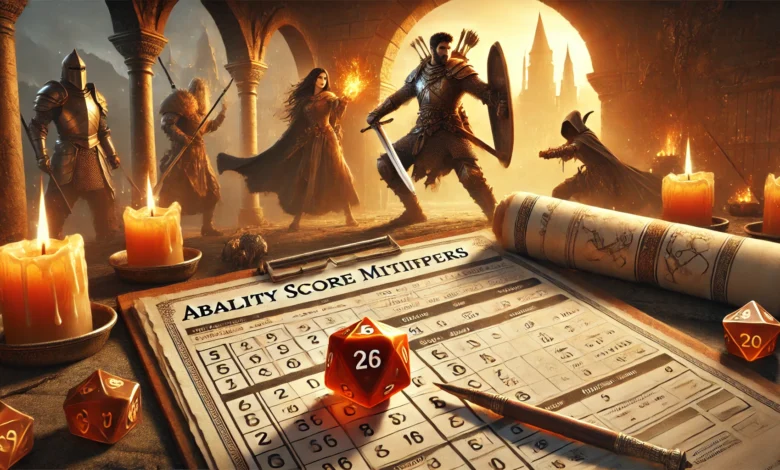The Ultimate Guide to Ability Score Modifiers in Tabletop RPGs

When diving into tabletop RPGs like Dungeons & Dragons (D&D), one of the most fundamental mechanics you’ll encounter is ability score modifiers. These little numbers might seem small, but they play a massive role in determining your character’s effectiveness in combat, skill checks, and just about everything else in the game.
If you’re new to RPGs or just need a refresher, this guide will break down ability score modifiers in detail, explaining how they work, how to calculate them, and why they’re essential for your character’s success.
What Are Ability Score Modifiers?
In most RPG systems, your character has six main attributes, commonly known as ability scores. These are usually:
- Strength (STR) – Physical power
- Dexterity (DEX) – Agility and reflexes
- Constitution (CON) – Stamina and toughness
- Intelligence (INT) – Knowledge and reasoning
- Wisdom (WIS) – Perception and insight
- Charisma (CHA) – Social ability and force of personality
Each of these scores typically ranges from 3 to 18 (before racial bonuses or other adjustments). However, the real impact of these scores comes from their corresponding ability score modifiers.
An ability score modifier is the number added (or subtracted) to your dice rolls whenever your character uses an ability tied to that score. This modifier reflects how much better (or worse) your character is compared to an average person with a score of 10.
How to Calculate Ability Score Modifiers
The formula for determining an ability score modifier is simple:
Modifier=Ability Score−102\text{Modifier} = \frac{\text{Ability Score} – 10}{2}
Always round down when calculating the modifier. Here’s a quick reference table to make things easier:
| Ability Score | Modifier |
|---|---|
| 1 | -5 |
| 2-3 | -4 |
| 4-5 | -3 |
| 6-7 | -2 |
| 8-9 | -1 |
| 10-11 | 0 |
| 12-13 | +1 |
| 14-15 | +2 |
| 16-17 | +3 |
| 18-19 | +4 |
| 20-21 | +5 |
| 22-23 | +6 |
So, if your character has a Strength score of 16, the modifier would be +3. If they have an Intelligence score of 8, the modifier would be -1.
Why Ability Score Modifiers Matter
Your ability score modifiers affect nearly every part of your gameplay experience. Here are some key areas where they come into play:
1. Attack Rolls

When making an attack, whether it’s with a sword or a spell, you’ll usually add an ability modifier to your attack roll. For example:
- Melee weapons use Strength (unless they have the Finesse trait, which allows Dexterity instead).
- Ranged weapons use Dexterity.
- Spells typically use Intelligence, Wisdom, or Charisma, depending on your class.
2. Damage Rolls
In most cases, your damage output is also affected by your ability score modifier. A fighter with 18 Strength (+4) will deal much more damage with a longsword than a wizard with 10 Strength (0).
3. Skill Checks
Skills like Stealth, Persuasion, or Perception are influenced by ability modifiers. If you’re a rogue with a Dexterity of 18 (+4), you’ll have a significant edge in sneaky maneuvers compared to someone with a lower Dexterity.
4. Saving Throws
When resisting effects like poison, charm, or magical spells, your saving throw will often rely on your ability score modifier. A character with high Constitution is much better at resisting poisons than one with a low score.
5. Spellcasting Ability
For spellcasters, ability score modifiers are crucial. A wizard’s spells are powered by Intelligence, a cleric’s by Wisdom, and a sorcerer’s by Charisma. The higher your spellcasting ability modifier, the harder your spells are to resist.
Increasing Ability Score Modifiers
Your character’s ability scores aren’t set in stone! There are ways to increase your ability score modifiers over time:
1. Leveling Up
Many RPG systems allow you to increase your ability scores as you level up. In Dungeons & Dragons 5e, for example, you get an Ability Score Improvement (ASI) at certain levels, allowing you to boost two scores by +1 or one score by +2.
2. Magic Items & Buffs
Items like the Belt of Giant Strength or the Tome of Understanding can dramatically boost an ability score, increasing its modifier in the process.
3. Feats
Some RPGs include feats—special perks that grant bonuses. Feats like Resilient or Tough can help boost specific abilities, improving their corresponding modifiers.
4. Racial Bonuses
Different fantasy races get unique bonuses to their abilities. For example, elves typically get a +2 to Dexterity, while dwarves often receive a +2 to Constitution. This can give certain classes a head start when optimizing their ability modifiers.
Optimizing Your Ability Score Modifiers for Your Class
Different character classes benefit from different ability score modifiers. Here’s a quick guide:
- Fighter / Barbarian → Prioritize Strength & Constitution for better melee attacks and durability.
- Rogue / Ranger → Focus on Dexterity for agility, stealth, and ranged attacks.
- Wizard / Artificer → Boost Intelligence for better spellcasting and knowledge-based skills.
- Cleric / Druid → Enhance Wisdom for strong spells and perception skills.
- Bard / Sorcerer / Warlock → Max out Charisma for powerful magic and social interactions.
Choosing the right ability score modifiers for your class will make a massive difference in how effective (and fun!) your character is to play.
Final Thoughts
Ability score modifiers are the backbone of character progression and gameplay in tabletop RPGs. Understanding how they work and how to optimize them will make you a more strategic and effective player. Whether you’re rolling attacks, dodging fireballs, or charming NPCs, your ability score modifiers are the numbers that decide your fate.
So next time you’re rolling a new character, take a moment to consider your ability scores and their modifiers. Your future self (and your dice rolls) will thank you!



